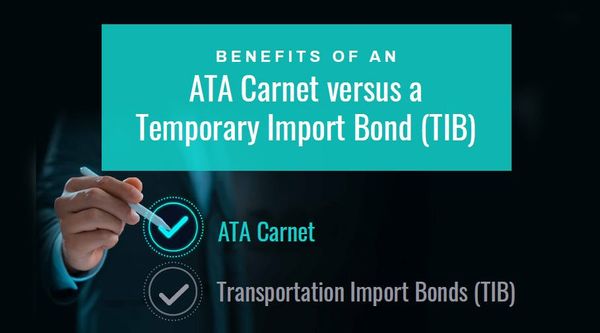Resource Center
Foreign ATA Carnet FAQs
Foreign ATA Carnet FAQs
All your questions answered regarding the treatment of Foreign ATA Carnets with U.S. Customs and Border Protection (USCBP).
How can I keep the goods entered into the U.S. on an ATA Carnet longer than the expiration date?
The U.S. does not accept extension ATA Carnets (commonly referred to as replacement ATA Carnets) however they do give you two options to keep the goods in the U.S. beyond the expiration date:
Option 1: Late re-exportation: USCBP must stamp an expired Foreign ATA Carnet exiting the U.S. Notations must be made on both voucher and counterfoil that the ATA Carnet has expired: e.g. “Carnet has expired, duties are payable”. Duties will be assessed depending on the date of re-export:
- Up to 90 days after ATA Carnet expiration will result in 25% of the duty and 10% penalty (minimum $50)
- Between 90 and 180 days after ATA Carnet expiration will result in 50% of the duty and 10% penalty (minimum $100)
- Goods re-exported 181 days after ATA Carnet expiration will result in 100% of the duty and 10% penalty
Option 2: Converting the ATA Carnet to a Temporary Import Bond (TIB):
- Must be completed before expiration date of the ATA Carnet
- Allows only one additional year to remain in the U.S.
- ATA Carnet Number must appear on the TIB paperwork.
- Merchandise description, weight and value must match the ATA Carnet General List.
- ATA Carnet’s re-exportation voucher should be presented and validated by U.S. Customs referencing the TIB number and date in box 2 of the re-exportation counterfoil (Action taken in respect of goods produced but note re-exported).
- The ATA Carnet is then sent back to the office of issue in the foreign country.
- Make sure to retain photocopies of the counterfoils with these validations in the event that CBP files a claim for goods not re-exported.
Can I convert an ATA Carnet to a Consumption Entry in order to keep the goods in the US indefinitely?
A foreign ATA Carnet cannot be converted to a consumption entry, as it is considered an anticipatory breach of the ATA Carnet entry. For goods staying in the US the procedure is to contact the Entry Team at the Customs port of importation and request an anticipatory breach of the ATA Carnet. To see how carnet support fits alongside trade, bond, and cargo solutions, explore our Solutions hub.
Documents required to accompany the anticipatory breach are:
A letter on the ATA Carnet holder letterhead itemizing the goods that will not be re-exported and requesting to pay liquidated damages
Copy of the front cover of the ATA Carnet, the General List, and the Importation Counterfoil validated by U.S. Customs.
Once a case number is issued by U.S. Customs and payment received, a receipt referencing the U.S. Customs Case number should be sufficient to discharge the items in the U.S. You and your customer should retain this proof as the foreign issuing office will send them a request of proof of re-exportation out of the U.S. or of duties paid to USCBP in order to close out the ATA Carnet.
What is the proper procedure if I only want to keep some items in the US and re-export the rest?
There are two different procedures you need to complete to ensure that this ATA Carnet goes smoothly with least amount of expense to you and or your customer.
Clearing the ATA Carnet for Export: send the ATA Carnet to Customs to be validated out of the U.S. but note in Box 1 of the re-exportation counterfoil (white) the item numbers leaving the U.S., and note the same item numbers in box F line a) on the corresponding re-exportation voucher. Also note the items not being re-exported (the items staying in the U.S.) in box F line c) and cross these items off the general list attached to the re-exportation voucher.
The goods staying in the U.S.: contact the Entry Team at the Customs port of importation and request an anticipatory breach of the ATA Carnet.
Documents required to accompany the anticipatory breach are:
– A letter on the ATA Carnet holder letterhead itemizing the goods that will not be re-exported and requesting to pay liquidated damages
– Copy of the front cover of the ATA Carnet, the General List, and the Importation Counterfoil validated by U.S. Customs, as well as a copy of the validated partial re-exportation counterfoil. When estimating values and security amounts tied to carnet movements, use our Calculators for quick numbers.
Once a case number is issued by U.S. Customs and payment received, a receipt referencing the U.S. Customs Case number should be sufficient to discharge the items in the United States. You and your customer should retain this proof as the foreign issuing office will send them a request of proof of re-exportation out of the U.S. or of duties paid to USCBP in order to close out the ATA Carnet.
Is a Power of Attorney needed to present an ATA Carnet to Customs?
Yes, if the Customs Broker or representative is not listed in Box B Authorized Representative on the Green Cover of the ATA Carnet then a Power of Attorney is needed to present the ATA Carnet for customs clearance.
U.S. Customs and Border protection considers ATA Carnet shipments as Customs Business under Customs Directive No. 3530-002A section 5.12, which means proof of authorization must be available if requested by a customs officer.















